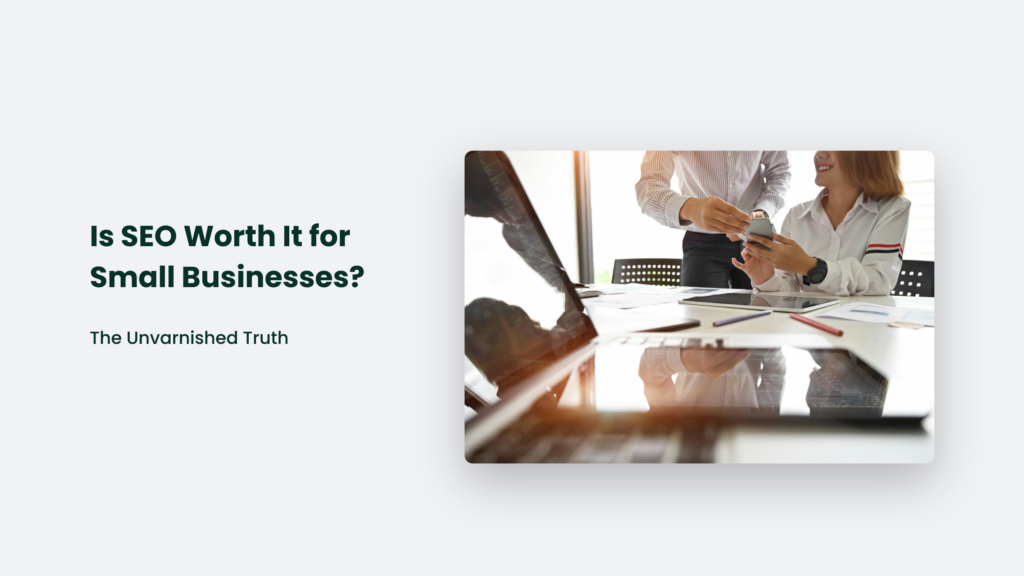Let’s cut the bullshit. You’re a small business owner, and you’re wondering if dumping your hard-earned cash into SEO is worth it. Well, buckle up, buttercup. We’re about to dive into the nitty-gritty of is SEO worth it for small businesses, and I promise you’ll come out the other side with a clear answer – even if it’s not the one you want to hear.

Is SEO Worth it for Small Businesses:
First things first: SEO isn’t some magical unicorn that’ll shower your business with instant success. It’s more like a stubborn mule – it takes time, effort, and much patience. But when done right, it can carry your business to places you never thought possible.
The Good, The Bad, and The Ugly of SEO for Small Businesses
The Good
- High Satisfaction Rates: 53.3% of business owners who invest $500 or more monthly in SEO reports being “extremely satisfied” with their results. It suggests that a moderate investment in SEO can yield significant satisfaction for small businesses.
- Impressive ROI: SEO boasts an average return on investment (ROI) of 22:1This means that for every dollar spent on SEO, businesses could potentially see a $22 return. SEO is one of the most cost-effective marketing strategies available to small businesses.
- Long-Term Benefits: Unlike paid advertising, which stops working when you stop paying, SEO can drive traffic and leads long after the initial investment.
The Bad
- Time-Consuming: SEO is not a quick fix. It typically takes 4-6 months to start seeing significant results. It can be frustrating for businesses looking for immediate returns.
- Ongoing Effort Required: SEO is not a set-it-and-forget-it strategy. Search engines constantly update their algorithms, and competitors try to improve their rankings. It means SEO requires continuous effort and adaptation.
- Complex and Ever-Changing: The rules of SEO are constantly evolving. What worked last year might work this year, requiring businesses to stay informed and adapt their strategies regularly.
The Ugly
- Lack of Adoption: A staggering 70% of small businesses don’t have an SEO strategy in place. It represents a significant missed opportunity for many small businesses to improve online visibility and attract customers.
- Resource Constraints: Many small businesses need more time, expertise, or budget to implement effective SEO strategies. This can put them at a disadvantage compared to larger competitors with more resources.
- Risk of Penalties: Improper SEO techniques, often called “black hat” SEO, can result in penalties from search engines, potentially causing severe damage to a business’s online presence.
The Benefits That’ll Make You Sit Up and Pay Attention
More Eyeballs on Your Business
SEO is like having a billboard in Times Square, minus the ridiculous rental fees. It increases your online visibility, putting your business in front of potential customers actively searching for what you offer. With over 5.6 billion searches processed by Google daily, that’s a lot of potential eyeballs.
Trust and Credibility on Steroids
When you show up in search results, especially on the first page, people assume you know your shit. It’s an instant credibility boost. In fact, 75% of users trust businesses listed on the first page of search results, Which is like getting a seal of approval from the internet gods.
ROI That’ll Make Your Accountant Blush
Remember that 22:1 ROI we mentioned earlier? Yeah, that beats the hell out of most other marketing channels. In perspective, SEO leads have a 14.6% close rate, while outbound leads (like direct mail or print advertising) struggle with a meager 1.7% close rate.
Local Love That’s Off the Charts
For small businesses, local SEO is the golden ticket. 76% of people who search for something nearby on their smartphone visit a related business within 24 hours. That’s not just foot traffic; that’s a stampede waiting to happen.
How to Do SEO Without Losing Your Mind (or Your Shirt)
Alright, so you’re convinced SEO might be worth a shot. But how do you actually do it without going broke or insane? Here’s the down-and-dirty guide:
- Get Your Google Game On: Set up Google Analytics and Google Search Console. They’re free, and it’ll give you more insights than your nosy neighbor.
- Keywords Are Your New Best Friends: Do some keyword research to find out what your potential customers are actually searching for.
- Make Your Website Less Shitty: Optimize your on-page elements. It includes your URLs, titles, headers, and content. Make it easy for humans and search engines to understand what you’re talking about.
- Content is King (But Don’t Be a Boring King): Create high-quality, relevant content. And for the love of all that’s holy, make it interesting.
- Get Local: If you’re a brick-and-mortar business, focus on local SEO. Claim your Google Business Profile and get some reviews.
The Bottom Line: Is SEO Worth It for Your Small Business?
Here’s the honest truth: SEO is worth it for most small businesses, but it’s not a magic bullet. It’s a long-term strategy that requires patience, effort, and, yes, some financial investment.
Consider this: 53.3% of all website traffic comes from organic searches. That’s a lot of potential customers you could be missing out on if you’re not in the SEO game.
If you’re looking for instant gratification, go buy a lottery ticket. But if you’re willing to put in the work for sustainable, long-term growth, SEO could be your ticket to small business stardom.
Remember, in the words of the great Wayne Gretzky, “You miss 100% of the shots you don’t take.” So why not try SEO? Your future customers are out there searching. Make sure they find you.
Frequently Asked Questions:
How often should I update my SEO strategy?
SEO isn’t a set-it-and-forget-it deal. You should be constantly monitoring and tweaking your strategy. A good rule of thumb is to thoroughly
review every 3-6 months.
What’s the most important factor in SEO?
There’s no single “most important” factor. SEO is a combination of many elements, including quality content, technical optimization, and backlinks.
What’s the difference between SEO and paid advertising?
SEO focuses on organic (unpaid) search results, while paid advertising involves paying for ad placement. SEO typically has a better long-term ROI, but takes longer to show results.




